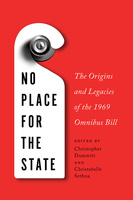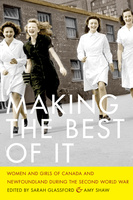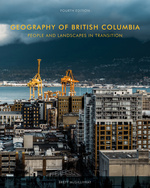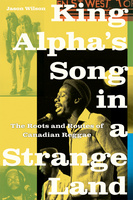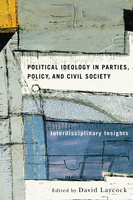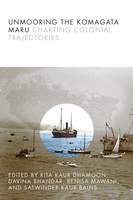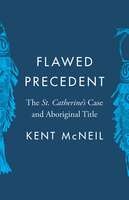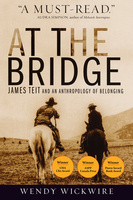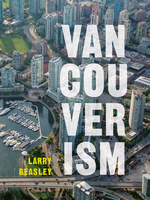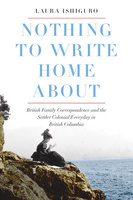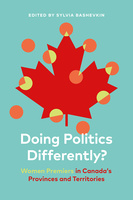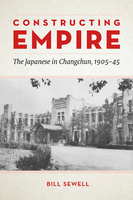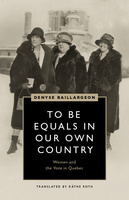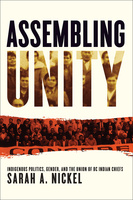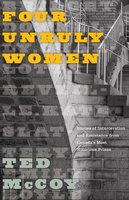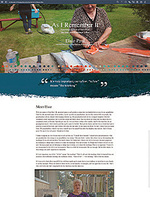Canada 1919
A Nation Shaped by War
With compelling insight, Canada 1919 exposes the ways in which the First World War shaped and changed Canada – and the ways it did not.
A Great Revolutionary Wave
Women and the Vote in British Columbia
The first book on the woman’s suffrage movement in British Columbia, A Great Revolutionary Wave traces the history of the fight for the vote from the 1870s to the 1940s against a backdrop of social reform, international social movements, labour politics, and settler colonialism.
He Thinks He's Down
White Appropriations of Black Masculinities in the Civil Rights Era
Offering fresh insights and raising important questions, this historical exploration of appropriation traces the ways in which gender and race were negotiated through the popular culture of the Civil Rights Era.
Contact!Unload
Military Veterans, Trauma, and Research-Based Theatre
This important book explores an arts-based therapeutic approach to mental health care, bringing to light the journeys of contemporary military veterans as they adjust to civilian life post-deployment.
War Junk
Munitions Disposal and Postwar Reconstruction in Canada
War Junk recounts the surprising history of leftover military munitions and supplies, revealing their complex political, economic, social, and environmental legacies in postwar Canada.
No Place for the State
The Origins and Legacies of the 1969 Omnibus Bill
No Place for the State is an incisive study that offers complex and often contrasting perspectives on the Trudeau government’s 1969 Omnibus Bill and its impact on sexual and moral politics in Canada.
Making the Best of It
Women and Girls of Canada and Newfoundland during the Second World War
Making the Best of It examines the ways in which gender and other identities intersected to shape the experiences of female Canadians and Newfoundlanders during the Second World War.
Geography of British Columbia, Fourth Edition
People and Landscapes in Transition
This extensively revised edition of Geography of British Columbia teaches students how to think like geographers as it takes them on a journey from the origins of the region’s diverse and unique landscapes to its more recent history as a province being reshaped by the forces of globalization.
Canada and Ireland
A Political and Diplomatic History
This intriguing study sheds light on Canada’s relationship with Ireland, revealing the origins, trials, and successes of the intimate and at times turbulent connection between the two countries.
Challenge the Strong Wind
Canada and East Timor, 1975–99
Challenge the Strong Wind recounts the story of Canadian policy toward East Timor from the 1975 invasion to the 1999 vote for independence, demonstrating that historical accounts need to include both government and non-governmental perspectives.
King Alpha’s Song in a Strange Land
The Roots and Routes of Canadian Reggae
This insider look at the forces that came together to make Canada’s reggae scene reaffirms the power of music to combat racism and build bridges between communities and cultures.
Canada's Mechanized Infantry
The Evolution of a Combat Arm, 1920–2012
Canada’s Mechanized Infantry examines the challenges facing the Canadian Army as it transformed its infantry from First World War foot soldiers to a twenty-first–century combat force integrating soldiers, vehicles, weapons, and electronics.
Medicine and Morality
Crises in the History of a Profession
The first historical study of morality and science in Canadian medicine, Medicine and Morality shows how moments of doubt in doctors’ impartiality resulted in changes to how medicine was done, and even to the very definition of medical practice itself.
The Impossible Clinic
A Critical Sociology of Evidence-Based Medicine
The aims of evidence-based medicine cannot be reconciled with its outcomes, yet this impossible practice persists at the intersection of professional medical regulation and liberal governance strategies.
The Good Fight
Marcel Cadieux and Canadian Diplomacy
The Good Fight is the insightful and entertaining biography of arguably the most important francophone diplomat and civil servant in Canadian history.
In the Spirit of ’68
Youth Culture, the New Left, and the Reimagining of Acadia
In the Spirit of ’68 tells the story of how a unique blend of local circumstance and global influence transformed Acadian New Brunswick’s youth culture, spawning one of the most influential revolutionary student movements in Canada.
Duty to Dissent
Henri Bourassa and the First World War
This revisionist account of Henri Bourassa’s writings and times reshapes our understanding of why Quebec diverged from the rest of Canada when it came to war.
For Home and Empire
Voluntary Mobilization in Australia, Canada, and New Zealand during the First World War
For Home and Empire compares home-front mobilization during the First World War in three British dominions, using a settler colonial framework to show that voluntary efforts strengthened communal bonds while reinforcing class, race, and gender boundaries.
Culture and the Soldier
Identities, Values, and Norms in Military Engagements
Culture and the Soldier offers a long-overdue examination of how culture – defined as reproduced identities, values, and norms – both shapes the military and can be wielded by it, informing the way armed forces operate around the world.
Capturing Hill 70
Canada’s Forgotten Battle of the First World War
This richly illustrated book offers a multifaceted account of one of the most successful but overlooked Canadian battles of the First World War.
A World without Martha
A Memoir of Sisters, Disability, and Difference
A World without Martha is an unflinching yet compassionate memoir of how one sister’s institutionalization for intellectual disability in the 1960s affected the other, sending them both on separate but parallel journeys shaped initially by society’s inability to accept difference and later by changing attitudes towards disability, identity, and inclusion.
Political Ideology in Parties, Policy, and Civil Society
Interdisciplinary Insights
This important study demonstrates that varied disciplinary approaches can illuminate the reach and impact of political ideologies on both politics and society.
Moments of Crisis
Religion and National Identity in Québec
Wide-ranging and theoretically sophisticated, Moments of Crisis offers a groundbreaking explanation for why religion continues to be implicated in national identity crises in Québec.
Canada on the United Nations Security Council
A Small Power on a Large Stage
This is the definitive history of the Canadian experience, both its successes and failures, on the world’s largest stage – the United Nations Security Council.
Unmooring the Komagata Maru
Charting Colonial Trajectories
Unmooring the Komagata Maru challenges conventional historical accounts to consider the national and transnational colonial dimensions of the Komagata Maru incident.
Moved by the State
Forced Relocation and Making a Good Life in Postwar Canada
Through five diverse episodes of forced relocation across Canada, Moved by the State offers a new look at the power of the welfare state and the political culture of postwar Canada.
Flawed Precedent
The St. Catherine’s Case and Aboriginal Title
This illuminating account of the St. Catherine’s case of the 1880s reveals the erroneous assumptions and racism inherent in judgments that would define the nature and character of Aboriginal title in Canadian law and policy for almost a century.
At the Bridge
James Teit and an Anthropology of Belonging
At the Bridge lifts from obscurity the story of James Teit (1864–1922), an outstanding Canadian ethnographer and Indian rights activist whose thoughtful scholarship and tireless organizing have been largely ignored.
Vancouverism
This is the remarkable story, told by a key insider, about Vancouver’s dramatic transformation from a typical mid-sized North American city into an inspiring world-class metropolis celebrated for its liveability, sustainability, and vibrancy.
The Nature of Canada
These captivating reflections on the history of our environment and ourselves will make you think differently not only about Canada’s past but also about our future.
Nothing to Write Home About
British Family Correspondence and the Settler Colonial Everyday in British Columbia
The first substantial study of family correspondence and settler colonialism, Nothing to Write Home About elucidates the significance of trans-imperial intimacy, epistolary silence, and the everyday in laying the foundations of settler colonialism in British Columbia.
Doing Politics Differently?
Women Premiers in Canada’s Provinces and Territories
Do women do politics differently? By assessing the legacies of eleven women premiers, this groundbreaking volume answers a question that has been debated around the world since women first demanded the right to vote and hold public office.
Constructing Empire
The Japanese in Changchun, 1905–45
While other studies focus on the role of diplomats and the military, Constructing Empire demonstrates that building the Japanese empire also required civilian participation.
The Empire on the Western Front
The British 62nd and Canadian 4th Divisions in Battle
Focusing on developments at the divisional level in Britain and Canada, The Empire on the Western Front casts a critical eye on how the British Empire transformed unseasoned volunteers into battle-ready soldiers for the Western Front.
Fighting with the Empire
Canada, Britain, and Global Conflict, 1867–1947
This insightful collection untangles the paradox of mobilizing a Canadian contribution to Britain’s imperial wars – and forging a national identity in the process.
To Be Equals in Our Own Country
Women and the Vote in Quebec
To Be Equals in Our Own Country chronicles the bitter struggle for women’s suffrage in Quebec, the last province to grant Canadian women this fundamental human right.
Assembling Unity
Indigenous Politics, Gender, and the Union of BC Indian Chiefs
Assembling Unity traces the history of pan-Indigenous unity in British Columbia through political negotiations, gendered activism, and the balance and exercise of power.
Four Unruly Women
Stories of Incarceration and Resistance from Canada’s Most Notorious Prison
Filled with stories of pain, regret, and resistance, this chilling account of how four women survived their time at Kingston Penitentiary stands as an indictment of the idea that prisons and punishment are society’s answer to crime.
As I Remember It
Teachings (Ɂəms tɑɁɑw) from the Life of a Sliammon Elder
Meet Elder Elsie Paul and discover her stories, family history, and teachings – ʔəms tɑʔɑw – in a multimedia, online book that captures the wit and wisdom of her storytelling.
Resisting Rights
Canada and the International Bill of Rights, 1947–76
Resisting Rights challenges the myths that Canada has always been at the forefront in the development of international human rights law and led the cause at the United Nations.






